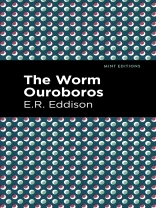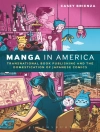The Worm Ouroboros (1922) is a high fantasy novel by E. R. Eddison. Inspired by the Norse sagas and medieval history, Eddison crafted an epic story of magic, adventure, romance, and war. Praised by New York Times critic Edwin Clark as a novel that “transcends all ordinary life, ” The Worm Ouroboros is frequently named among the greatest works of fantasy fiction ever produced. At their palace in Demonland, Lord Juss, his brothers Goldry and Spitfire, and their cousin Brandoch Daha receive an ambassador from Witchland. After a brief introduction, the visiting dwarf reveals his business—King Gorice XI demands their absolute fealty. Rather than submit, however, Lord Juss challenges Gorice to a wrestling match with Goldry, to be held on the neutral Foliot Isles. Knowing the fate of Mercury hangs in the balance, Goldry fights bravely and defeats the wicked King. Through black magic, however, an evil sorcerer condemns Gordry to imprisonment on a mystical mountain peak. Distraught, Juss, Spitfire, and Brandoch return to Demonland to mount an army in order to march on the capital of the Witches, who have joined forces with Lord Gro of Goblinland. The Lords of Demonland break through enemy lines, making their way to the citadel of Carcë, where they mistakenly believe Goldry has been taken. The Worm Ouroboros is a story of bravery and betrayal by a master of high fantasy whose imaginative gifts have influenced generations of devoted readers. This edition of E. R. Eddison The Worm Ouroboros is a classic of British literature reimagined for modern readers.
Since our inception in 2020, Mint Editions has kept sustainability and innovation at the forefront of our mission. Each and every Mint Edition title gets a fresh, professionally typeset manuscript and a dazzling new cover, all while maintaining the integrity of the original book.
With thousands of titles in our collection, we aim to spotlight diverse public domain works to help them find modern audiences. Mint Editions celebrates a breadth of literary works, curated from both canonical and overlooked classics from writers around the globe.
Про автора
E. R. Eddison (1882-1945) was an English novelist and civil servant. Born in Leeds, Eddison was educated by private tutors and formed an early friendship with Arthur Ransome, who would later become a popular children’s author. Eddison studied at Oxford before taking a position as a civil servant for the Board of Trade, where he would spend his entire career. On the side, he pursued his literary interests as an influential writer of high fantasy novels. He found success with The Worm Ouroboros (1922) and his Zimiamvian Trilogy, which have been praised by such figures as J. R. R. Tolkein, C. S. Lewis, and Ursula K. Le Guin. Eddison invented his own vibrant worlds and memorable characters, taking inspiration from Norse myth, medieval history, and Jacobean literature.












